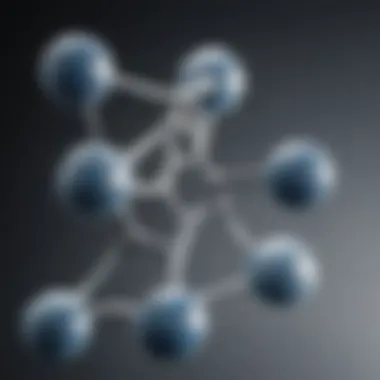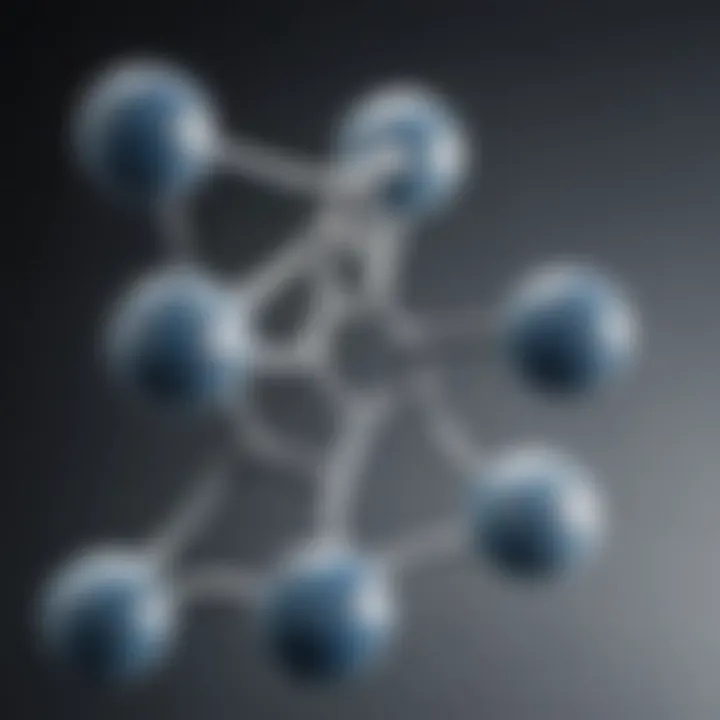Understanding Glutathione: Biochemical Insights and Health Benefits


Intro
Glutathione is a peptide that has gained significant attention in the fields of biochemistry and nutrition. As a powerful antioxidant, it plays a vital role in protecting cells from oxidative stress and damage. Understanding glutathione is crucial not only for researchers but also for anyone interested in improving their health. This article will unfold the complexities of this important molecule, including its biochemical properties, synthesis pathways, and health benefits.
Research Overview
In this section, we will delve into the latest findings on glutathione and how it interacts with various physiological processes. Through examining current research, one can appreciate its essential role in health and disease management.
Key Findings
- Antioxidant Properties: Glutathione is known for its ability to neutralize free radicals and reduce oxidative stress. This function is essential for maintaining cellular health.
- Detoxification: It aids in the detoxification of harmful substances. Glutathione binds to toxins, making them easier for the body to eliminate.
- Role in Disease: Low levels of glutathione have been linked to various diseases, including cancer, diabetes, and neurodegenerative conditions.
- Impact of Diet: Lifestyle choices, such as diet and activity level, can significantly influence glutathione levels in the body.
Study Methodology
Recent studies often utilize techniques such as liquid chromatography and mass spectrometry to measure glutathione concentrations in biological samples. Researchers analyze varying populations to assess the relationship between glutathione levels and specific health outcomes. The methodologies adopted are vital for establishing a correlation between glutathione and health.
Background and Context
Understanding the context of glutathione within scientific literature is essential. A historical perspective can reveal how perceptions and theories around antioxidants have evolved.
Historical Background
Glutathione was first discovered in 1888 by J. M. C. R. Friction and has since been the subject of extensive study. The understanding of its functions and necessity in human biology has transformed over the decades. Early research primarily focused on its role in enzymatic reactions and cellular metabolism. Now, focus has shifted towards its antioxidant and detoxifying capabilities.
Current Trends in the Field
Today, research on glutathione encompasses several areas, including:
- Aging and its effects on antioxidant levels.
- The influence of nutrition on the synthesis of glutathione.
- The role of glutathione in immune system function.
- Investigations into supplementation and its effectiveness for enhancing levels.
Overall, glutathione is a critical molecule. Its importance cannot be overstated in the context of human health. This exploration will further elucidate its many complexities and significance.
Foreword to Glutathione
Glutathione is a small but crucial peptide that plays an essential role in the biological systems of living organisms. Understanding glutathione is not just an academic endeavor; it is fundamental to grasping how our bodies protect and heal themselves. This introduction will highlight the significance of glutathione, its roles in cellular physiology, and its implications for health.
Glutathione is synthesized in cells and comprises three amino acids: cysteine, glycine, and glutamic acid. This simple structure belies its complexity and importance in biological reactions. Its primary functions include acting as a powerful antioxidant, participating in detoxification processes, and supporting immune function. The relevance of glutathione extends to various health concerns, including age-related diseases, chronic inflammation, and the body's response to toxins.
Definition and Basic Structure
Glutathione, often abbreviated as GSH, is a tripeptide that exists in reduced (GSH) and oxidized forms (GSSG). The reduced form, GSH, is active and participates directly in cellular reactions. It is the presence of sulfur in cysteine that gives glutathione its potent reducing properties, making it an effective antioxidant.
Each component of glutathione contributes to its functional capabilities. Cysteine allows for the formation of disulfide bonds, which are crucial in maintaining protein structure and function. Glycine contributes to substrate binding, while glutamic acid aids in the stability of the peptide structure. This teetering balance of components makes glutathione not just a simple antioxidant but an essential regulator within the cellular environment.
Historical Context and Discovery
The journey of glutathione discovery dates back to its identification in 1888 by the chemist J. L. C. de Klercker. Initially, it was isolated from yeast extracts and later characterized as a dipeptide in the 1920s. However, the true breadth of its biological significance emerged gradually over the decades.
In the 1940s, researchers recognized glutathione's role in cellular metabolism and its restorative functions. Later studies revealed its impact on oxidative stress and redox homeostasis. Today, glutathione is recognized not only as a pivotal antioxidant but also as a crucial player in various metabolic pathways, highlighting its broad spectrum of importance across health and disease.
"Glutathione acts as a critical safeguard against oxidative damage, maintaining cellular health and function."
The science surrounding glutathione continues to evolve. Ongoing research highlights its importance in disease prevention and management, making an understanding of this molecule key for students, researchers, and professionals alike.
Biochemical Properties of Glutathione
Glutathione plays a significant role in maintaining cellular health. Its properties make it essential for various biochemical processes. Understanding these properties helps uncover its relevance in health and illness. Two major aspects of glutathione's biochemical properties are its chemical structure and its function as an antioxidant.


Chemical Structure
Glutathione is a tripeptide composed of three amino acids: glutamine, cysteine, and glycine. The specific sequence is crucial because it determines how glutathione interacts with other molecules. The linked structure enables it to undergo various redox reactions, functioning effectively in different cellular environments.
The cysteine component is the most significant in this triad. It has a sulfhydryl group that can easily gain or lose electrons. This ability allows glutathione to act as a reducing agent, helping it neutralize harmful oxidants within the body. Its small size facilitates easy diffusion across cell membranes, making it readily available for cellular processes.
Role as an Antioxidant
Glutathione's primary role as an antioxidant is to protect cells from oxidative damage. This damage can come from free radicals generated by metabolic processes or from external sources like pollution and radiation. By neutralizing these free radicals, glutathione helps maintain oxidative balance within cells.
Some key functions include:
- Reduction of oxidative stress: High levels of glutathione prevent cellular injury from excess reactive oxygen species.
- Regeneration of other antioxidants: Glutathione helps restore the activity of vitamins C and E after they neutralize free radicals.
- Support for detoxification: It binds to toxins and helps eliminate them from the body, providing a crucial line of defense against harmful substances.
"Glutathione acts as a buffer against oxidative stress, enhancing overall cellular resilience."
These properties underscore glutathione's essential roles, helping maintain health at the cellular level while also providing insights into its contributions to disease management. Understanding these biochemical properties creates a foundation for grasping the wider implications of glutathione in both health and disease.
Synthesis and Regulation of Glutathione
Understanding the synthesis and regulation of glutathione is essential for grasping its role in maintaining health. Glutathione is synthesized in the body through specific biochemical pathways and is tightly regulated to ensure optimal levels. The efficient production and maintenance of glutathione are crucial as they influence overall health and the body's response to stressors.
Biosynthetic Pathways
The biosynthesis of glutathione occurs primarily in the cytosol. It is formed from three amino acids: cysteine, glutamate, and glycine. These amino acids undergo a series of enzymatic reactions, beginning with the condensation of cysteine and glutamate, catalyzed by gamma-glutamylcysteine synthetase. This step is followed by the addition of glycine to form glutathione, facilitated by glutathione synthetase. The rate of glutathione synthesis is not static; it fluctuates based on various internal and external factors, including nutrient availability and oxidative stress levels.
Some factors that enhance biosynthesis include:
- Adequate dietary intake of sulfur-containing foods: Foods like garlic, onion, and cruciferous vegetables can provide key components for glutathione production.
- Presence of micronutrients: Minerals such as selenium and magnesium are important co-factors in the synthesis process.
- Physical exercise: Regular activity has been shown to positively influence glutathione levels.
Regulation of Glutathione Levels
Regulation of glutathione levels involves complex mechanisms that ensure its concentration remains within a physiologically beneficial range. Glutathione plays a significant role in detoxification, acting to neutralize harmful substances in the body. Thus, its levels must be tightly controlled.
Key regulatory elements include:
- Enzymatic activity: Enzyme levels, including gamma-glutamylcysteine synthetase, can change in response to the body's needs.
- Cellular conditions: Oxidative stress and inflammation can lead to changes in glutathione levels. When cells are under stress, demand for glutathione increases.
- Feedback mechanisms: High levels of reactive oxygen species stimulate the synthesis of glutathione, creating a feedback loop that heightens production.
"Maintaining adequate glutathione levels is critical in preventing cellular damage and promoting overall health."
Health Benefits of Glutathione
The significance of glutathione extends beyond mere cellular functions. This powerful antioxidant plays a vital role in enhancing overall health. Understanding its benefits is essential for anyone interested in biochemistry, health sciences, or personal well-being. Glutathione's roles can be categorized into various aspects, yet three primary areas stand out: cellular protection, immune function, and detoxification.
Cellular Protection
Glutathione is essential for cellular integrity. This antioxidant actively neutralizes free radicals, protecting cells from oxidative damage. When oxidative stress occurs, it can lead to cell injury and death, which has been linked to numerous chronic diseases. By maintaining the redox state, glutathione safeguards cellular components like DNA, lipids, and proteins from harm.
Without sufficient glutathione, cells become vulnerable. This vulnerability can accelerate aging and promote disease. Research indicates that optimal levels of glutathione correlate with improved cellular longevity and resilience. In essence, glutathione's role in cellular protection is indispensable, especially in an era where stressors, both environmental and internal, are prevalent.
Impact on Immune Function
Glutathione is intricately linked with immune health. It modulates immune responses, enhancing the efficiency of immune cells such as T lymphocytes and natural killer cells. When glutathione levels are adequate, the immune system effectively responds to pathogens and maintains homeostasis.
Conversely, low glutathione levels can impair immune responses. This deficiency may lead to increased susceptibility to infections and a slower recovery process. Studies have shown that glutathione supplementation could bolster immune function, particularly in individuals under stress or those with compromised immunity. Thus, for those engaged in research or personal health endeavors, recognizing this connection is crucial.
Role in Detoxification


The detoxification capabilities of glutathione are particularly noteworthy. It aids in the neutralization of harmful substances, facilitating their expulsion from the body. Hepatic detoxification processes rely heavily on glutathione. The liver, which is the primary detox organ, calls upon this antioxidant to conjugate and eliminate toxins effectively.
Moreover, glutathione plays a role in mitigating the effects of environmental toxins and heavy metals, which have far-reaching implications for public health. The incorporation of glutathione_supplements can enhance the detoxification pathways, thus improving overall health. Greater awareness of this function supports the growing discourse on lifestyle choices that affect glutathione status.
In summary, the health benefits of glutathione are profound, encompassing cellular protection, boosting immune function, and facilitating detoxification. Each aspect highlights its importance in maintaining optimal health and offers avenues for further inquiry and application in health sciences.
Glutathione and Disease Management
Understanding the relationship between glutathione and disease management is essential for recognizing its crucial role in maintaining health. Glutathione is not just an antioxidant; it plays a pivotal role in various biochemical processes that can influence disease outcomes. This section delves into its significance in managing conditions like cancer, neurological disorders, and cardiovascular health.
Cancer and Glutathione
Glutathione holds a complex relationship with cancer. On one hand, it acts as a protector for healthy cells by neutralizing free radicals and reducing oxidative stress. On the other hand, many cancer cells have higher levels of glutathione, facilitating their resistance to chemotherapy. When treating cancer, understanding glutathione's role becomes vital. Cancer therapies often aim to manipulate glutathione levels to enhance the efficacy of drugs.
Research suggests that lowering glutathione in cancer cells can make them more sensitive to treatment. This interplay underscores the need for a balanced approach to glutathione management in oncology. Regular monitoring of glutathione levels may help tailor treatment plans for patients.
Neurological Disorders
Neurological disorders, including Parkinson’s disease and Alzheimer’s disease, show significant links to glutathione levels. Oxidative stress has been recognized as a contributing factor in these conditions. Low glutathione levels can lead to increased neuronal damage, hence understanding its role is crucial.
Studies have demonstrated that enhancing glutathione levels can protect against neurodegeneration. Some researchers advocate for therapies that could increase glutathione levels in the brain, possibly easing symptoms and slowing the progression of neurological diseases. The focus on glutathione in this context highlights its potential as a therapeutic target in ongoing research aimed at developing effective treatments.
Cardiovascular Health
In the realm of cardiovascular health, glutathione contributes to maintaining a healthy vascular system. Its antioxidant properties assist in reducing inflammation and preventing the oxidation of LDL cholesterol, which is a key factor in atherosclerosis. Elevated oxidative stress can lead to endothelial dysfunction, a precursor to various heart diseases.
Research indicates that optimal glutathione levels can confer protective effects against cardiovascular diseases. By modulating oxidative stress, glutathione helps in maintaining cardiovascular health. Encouraging communities to focus on boosting glutathione levels through diet and lifestyle changes could prove beneficial for heart health.
"Understanding the implications of glutathione can lead to more effective disease management strategies and improve health outcomes for individuals at risk or suffering from chronic diseases."
In summary, glutathione's multifaceted role in disease management warrants careful attention. Its involvement in cancer, neurological disorders, and cardiovascular health offers insights that could shape future therapeutic approaches.
Lifestyle Factors Affecting Glutathione Levels
The levels of glutathione in the body are influenced by various lifestyle factors. Understanding these influences can provide insights into how we can optimize our health. Glutathione serves as a key antioxidant, which means that its levels can significantly affect our body's ability to detoxify and protect itself against oxidative stress. Factors including diet, exercise, stress, and exposure to environmental toxins all play roles in maintaining or depleting glutathione levels.
Dietary Influences
Diet plays a critical role in the synthesis and regulation of glutathione. Foods rich in sulfur, such as garlic, onions, and cruciferous vegetables like broccoli and kale, can stimulate the production of glutathione. Additionally, consuming foods containing selenium, such as nuts and whole grains, can help enhance its antioxidant effects. A diet lacking in these essential nutrients could lead to reduced glutathione levels and impaired antioxidant function.
"A balanced diet with sufficient sulfur-containing and selenium-rich foods is vital for maintaining optimal glutathione levels."
Furthermore, specific amino acids like cysteine, glycine, and glutamate are necessary for the synthesis of glutathione. Thus, protein sources such as meat, fish, and legumes are essential for supporting glutathione production. Processed foods high in sugar and unhealthy fats can contribute to oxidative stress, thereby increasing the demand for glutathione.
Exercise and Glutathione
Regular physical activity has been shown to positively affect glutathione levels. Exercise, particularly aerobic activities, fosters an adaptive response in which the body's antioxidant defenses are enhanced. This results in increased levels of glutathione post-exercise. Moreover, exercise promotes better circulation, which helps in the delivery of nutrients required for glutathione synthesis.
However, excessive or high-intensity exercise could lead to oxidative stress, temporarily depleting glutathione. Therefore, a balanced exercise regime is crucial. Moderate and consistent physical activity supports the maintenance of optimal glutathione levels while preventing overexertion that might lead to depletion.
Stress and Environmental Toxins
Stress, both psychological and physical, contributes significantly to lowering glutathione levels. Chronic stress leads to an increase in oxidative stress, which necessitates a greater demand for antioxidants like glutathione. Managing stress through practices such as mindfulness, adequate sleep, and relaxation techniques can help preserve sufficient glutathione levels.
Environmental toxins also pose a threat to glutathione levels. Exposure to pollutants, heavy metals, and chemicals can overburden the body's detoxification pathways, depleting glutathione reserves. Effective detoxification relies on adequate glutathione levels, highlighting the importance of reducing exposure to these harmful substances. One approach is to minimize the use of synthetic chemicals in household products and strive for cleaner, more natural environments.
In summary, the factors affecting glutathione levels are diverse and interrelated. By recognizing the influence of diet, exercise, stress, and environmental conditions, individuals can take proactive steps to safeguard and optimize their glutathione levels effectively.


Glutathione Supplementation
Glutathione supplementation is an area of growing interest and importance in health and wellness discussions. This is particularly due to glutathione's role as a potent antioxidant in the body. It helps in neutralizing free radicals and supporting various biological processes. Despite the body's ability to produce glutathione, several factors can lead to decreased levels. These factors include age, stress, poor diet, and exposure to environmental toxins. Therefore, understanding how supplementation can restore these levels is crucial.
Forms of Supplementation
Various forms of glutathione supplementation are available in the market. These include:
- Oral Supplements: Available in capsules and tablets, oral supplements are the most common form. They typically contain reduced glutathione or precursors like N-acetylcysteine.
- Intravenous (IV) Administration: This method bypasses the digestive system, allowing for direct introduction into the bloodstream. It is considered more effective in rapidly raising glutathione levels.
- Transdermal Applications: Creams or patches that deliver glutathione through the skin are also gaining popularity. This method aims to enhance absorption directly into the bloodstream.
- Inhalation: Some products allow inhalation of glutathione, providing another alternative for those who may have issues with oral intake.
The choice of form can influence the effectiveness and convenience of supplementation.
Efficacy of Oral Supplements
The efficacy of oral glutathione supplements has been a subject of debate among researchers. While some small studies suggest that oral glutathione may lead to increased plasma levels, others indicate that the gastrointestinal tract can break down glutathione before it enters circulation. Therefore, the conclusion remains mixed.
However, supplements that contain precursors to glutathione, such as L-cysteine or N-acetylcysteine, are believed to support the body’s own production of glutathione more effectively. This aspect could make them a more efficient alternative compared to direct glutathione supplementation.
Potential Risks and Considerations
While glutathione supplementation can offer benefits, it is essential to consider potential risks. Some individuals may experience side effects such as:
- Gastrointestinal discomfort
- Allergic reactions in sensitive individuals
- Possible interactions with medications, especially those affecting liver function
Furthermore, the long-term effects of glutathione supplementation are not well understood. Therefore, it is crucial to consult healthcare professionals before beginning any supplementation regimen. Overall, weighing the benefits against the risks ensures safer usage.
Future Research Directions
The exploration of glutathione holds potential benefits for various fields, including medicine, biochemistry, and nutrition. Understanding future research directions can enhance our grasp of this molecule's capabilities and its implications for health and disease management. Emerging studies may uncover new therapeutic applications, mechanisms of action, and the interplay between glutathione and other biological systems. This information could lead to more effective treatment options for numerous conditions.
Emerging Studies on Glutathione
Recent studies focus on the role of glutathione in cellular processes related to aging and chronic diseases. Researchers investigate how glutathione levels fluctuate in different health contexts, aiming to correlate these changes with disease states such as diabetes, Alzheimer's, and cancer. For instance, laboratories are examining whether boosting glutathione can mitigate oxidative stress, thus potentially slowing down disease progression.
Moreover, clinical trials are underway to evaluate various glutathione supplementation methods, analyzing their efficacy and safety. Some studies explore intravenous administration versus oral supplementation, scrutinizing which offers better absorption and bioavailability. It is vital to understand the optimal dosing and duration for effective outcomes.
"Continued research on glutathione may lead to meaningful advancements in both preventive and therapeutic strategies for several diseases."
Interdisciplinary Approaches
An interdisciplinary approach is essential in furthering the research on glutathione. Collaboration between biochemists, pharmacologists, nutritionists, and clinicians can yield comprehensive insights into how glutathione interacts within biological systems.
For instance, integrating nutritional science with biochemistry may help identify dietary sources that effectively enhance glutathione levels. Researchers could focus on the potential of specific foods, like cruciferous vegetables, and how they modulate glutathione synthesis.
Additionally, exploring glutathione's role in mental health is an emerging area of focus. Psychiatrists and neurobiologists may collaborate to understand how oxidative stress affects neurological function and whether enhancing glutathione can alleviate symptoms in disorders such as depression and anxiety.
In summary, as research continues to evolve, interdisciplinary efforts will promote a thorough understanding of glutathione's vast potential and application across diverse health domains.
The End
In this article, we have delved into the multifaceted role of glutathione. The importance of concluding our exploration lies in reinforcing how vital this molecule is for human health. With its potent antioxidant capabilities, glutathione actively protects cells from oxidative stress, which can cause significant damage. This leads to several health benefits, including enhanced immune function and improved detoxification processes. Understanding the intricacies of glutathione not only illuminates its biochemical properties but also establishes its relevance in disease management and prevention.
Summary of Key Points
- Antioxidant Role: Glutathione acts as a crucial antioxidant, combating free radicals that contribute to cellular damage.
- Synthesis: It is produced from amino acids cysteine, glutamine, and glycine within the body, highlighting the importance of adequate nutrition for its maintenance.
- Health Benefits: The molecule is essential for processes like detoxification, immune support, and cellular repair.
- Impact of Lifestyle: Diet, exercise, and environmental factors can significantly affect glutathione levels.
- Supplementation: Various forms of glutathione supplements are available, though efficacy and potential risks should be carefully considered.
Final Thoughts on Glutathione's Importance
Glutathione stands out as more than just a simple molecule. Its complexity and versatility make it an essential biomolecule for health. As lifestyles become increasingly hectic, understanding how to optimize glutathione levels can lead to better health outcomes.
The current body of research increasingly supports the idea that maintaining adequate glutathione levels can play a role in preventing age-related diseases, improving physical performance, and even enhancing mental clarity. Therefore, its study should not be overlooked. By prioritizing our understanding of this critical antioxidant, we can take informed steps toward a healthier future.
Proper levels of glutathione can help mitigate many chronic health issues, making it a pivotal focus in both personal health optimization and therapeutic research.







